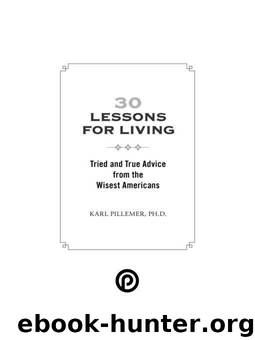30 Lessons for Living: Tried and True Advice from the Wisest Americans by Karl Pillemer Ph.D

Author:Karl Pillemer Ph.D. [Pillemer Ph.D., Karl]
Language: eng
Format: mobi
Publisher: Penguin Group US
Published: 2011-11-09T14:00:00+00:00
The Second Lesson:
Act Now like You Will Need Your Body for a Hundred Years
One guideline for selecting the lessons for living in this book was to “avoid the obvious.” For this reason I haven’t focused on some commonly offered pieces of advice like “love your family” or “work hard.” Similarly, most of the experts included a recommendation along the lines of “take care of your health” or “if you don’t have your health, you don’t have anything.” In our health-conscious society—where you can’t go for a single day without hearing about the dangers of trans fats, excess calories, soda, or the sedentary life—this prescription from the experts doesn’t seem very newsworthy.
Except that it is. From decades of observing their own and other people’s behaviors, the experts offer one profound and extraordinarily important message that can transform how you look at your health. It involves rethinking how to motivate yourself to stay healthy and how to select the habits that will be the most important in determining your experience of later life (which, remember, may last thirty years or more). Here’s the core of the lesson: it’s not dying you should worry about—it’s chronic disease.will
When most of us think about how our current behaviors will affect us later on, the experts say our focus is all wrong. We’re thinking about death, when we should be thinking about disease. And that leads us to make all kinds of bad decisions now that can leave us miserable years or decades later. You may not have been convinced by all those public health messages on television, or by your spouse nagging you, but I hope you will at least take the experts’ advice on this one point.
Over the years, I’ve noticed that when people engage in a habit that’s bad for their health they try to justify it by talking about dying. I give you as an example one of the people I loved most in my life: my mother-in-law. She was a five-foot-tall, feisty Scottish immigrant. She was funny, a cutthroat Scrabble player, and one of the kindest people I have ever known. But she loved bacon and sausage, red meat, Scotch whiskey, and sweets. She was also a pack-a-day smoker and not fond of exercise. I used to nag her about these health behaviors, but it fell on deaf ears.
She would tell me that she enjoyed these vices, and that she didn’t care how long she lived. “People live too long anyway,” she would say. She would assert that Americans worried too much about dying and that made us puritanical about health. I have had this experience over and over. Acquaintances who are obese or smokers or nonexercisers frequently say that no one lives forever and, “Well, if it just cuts a few years of my life, it’s worth it to me.” A devout Catholic, when my mother-in-law got fed up with me she’d tell me that her health plan was to stay in a state of grace—that way she’d be ready if she suddenly dropped dead.
Download
This site does not store any files on its server. We only index and link to content provided by other sites. Please contact the content providers to delete copyright contents if any and email us, we'll remove relevant links or contents immediately.
| Anthropology | Archaeology |
| Philosophy | Politics & Government |
| Social Sciences | Sociology |
| Women's Studies |
Cecilia; Or, Memoirs of an Heiress — Volume 1 by Fanny Burney(32548)
Cecilia; Or, Memoirs of an Heiress — Volume 2 by Fanny Burney(31947)
Cecilia; Or, Memoirs of an Heiress — Volume 3 by Fanny Burney(31932)
The Great Music City by Andrea Baker(31917)
We're Going to Need More Wine by Gabrielle Union(19034)
All the Missing Girls by Megan Miranda(15959)
Pimp by Iceberg Slim(14488)
Bombshells: Glamour Girls of a Lifetime by Sullivan Steve(14057)
For the Love of Europe by Rick Steves(13915)
Talking to Strangers by Malcolm Gladwell(13350)
Norse Mythology by Gaiman Neil(13349)
Fifty Shades Freed by E L James(13233)
Mindhunter: Inside the FBI's Elite Serial Crime Unit by John E. Douglas & Mark Olshaker(9324)
Crazy Rich Asians by Kevin Kwan(9279)
The Lost Art of Listening by Michael P. Nichols(7494)
Enlightenment Now: The Case for Reason, Science, Humanism, and Progress by Steven Pinker(7306)
The Four Agreements by Don Miguel Ruiz(6745)
Bad Blood by John Carreyrou(6611)
Weapons of Math Destruction by Cathy O'Neil(6267)
